Resources
12 min read
Last updated:
Security Information and Event Management (SIEM) is a combination of Security Information Management (SIM) and Security Event Management (SEM). A SIEM solution provides real-time analysis of security alerts generated by applications and networks. SIM is the collection, monitoring and analysis of security-related data such as log files into a central repository for trend analysis.
SEM is the process of network event management including real-time threat analysis, visualization and incident response. It operates by using data inspection tools to centralize the storage and interpretation of logs or events that are generated by other software running on a network. SIEM tools are important in the identification of cyber attacks and offer real-time analysis of security alerts.
Log files are great with threat detection and any comprehensive SIEM tool will have log management capabilities as one of its features. Free and Open-source SIEM tools have recently grown in their popularity. While they are limited in their capabilities (compared with their paid counterparts), they have found much usage among small to medium size organizations. In this post, we’ll look at some of the best free and open source SIEM tools out there today.
Contents
- What are SIEM tools?
- The Importance of SIEM Tools for Organizations
- 1. AlienVault OSSIM
- 2. SIEM Monster
- 3. Wazuh
- 4. Snort
- 5. OSSEC
- 6. Sagan
- 7. Logit.io
- 8. Apache Metron
- 9. Prelude
- 10. Splunk Free
- 11. Mozdef
- 12. Security Onion
- 13. Suricata
- 14. Graylog
- 15. Panther
- 16. Blumira
- 17. QRadar
- 18. Exabeam
- 19. ArcSight ESM
- 20. FortiSIEM
- SIEMBol
- Matano
- DSIEM
- SIEM GDPR
- Comparison Table
What are SIEM tools?
A SIEM (Security Information and Event Management) tool is a software solution designed to provide comprehensive cybersecurity monitoring, threat detection, and incident response capabilities for an organization's IT infrastructure. SIEM tools collect and analyze data from various sources, including logs, network traffic, and security events, to identify potential security threats and vulnerabilities. They play a crucial role in enhancing an organization's overall security posture.
The Importance of SIEM Tools for Organizations
Organizations are increasingly relying on SIEM tools for several crucial reasons:
Cyberattack Protection: SIEM tools provide real-time analysis of security alerts generated by network hardware and applications. This rapid assessment helps in identifying and mitigating potential threats before they can cause harm.
Compliance Assurance: With many industries facing strict regulatory requirements regarding data protection, SIEM helps ensure that organizations comply with legal standards, thereby avoiding hefty fines and reputational damage.
Comprehensive Security Overview: By centralizing the security information, SIEM tools offer a comprehensive overview of an organization’s security landscape. This holistic view is essential for assessing security posture and planning improvements.
SIEM tools are not standalone solutions but are comprised of various components that work together, including log collection, event correlation, alerting, and dashograms (dashboard presentations). As cyber threats grow more sophisticated, the role of SIEM systems as a cornerstone of cybersecurity strategies becomes increasingly vital for every organization keen on protecting its digital resources.
1. AlienVault OSSIM
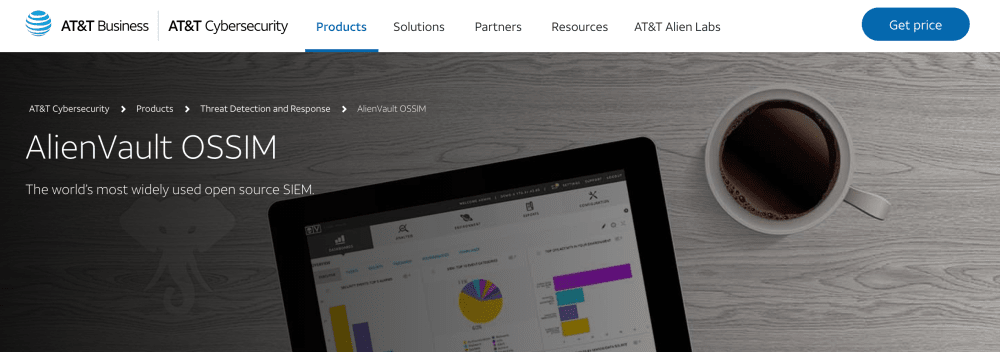 OSSIM was developed by AlienVault as a single unified platform equipped with some of the most valuable security capabilities including:
OSSIM was developed by AlienVault as a single unified platform equipped with some of the most valuable security capabilities including:
- Asset discovery
- Intrusion detection
- SIEM Event Correlation
- Vulnerability assessment
- Behavioural monitoring
OSSIM carries out event collection, normalization and correlation making it a comprehensive tool when it comes to threat detection. It has a logging tool, long-term threat assessment and built-in automated responses. Some of the Pros and Cons of this tool include;
Pros:
- Can be operated on-premise and virtually
- Requires only a single server
- There is community support via its product forum
- Developers provide ongoing development increasing its value to users
Cons
- Limited flexibility making its customization a long process.
- Labour-intensive setup.
2. SIEM Monster
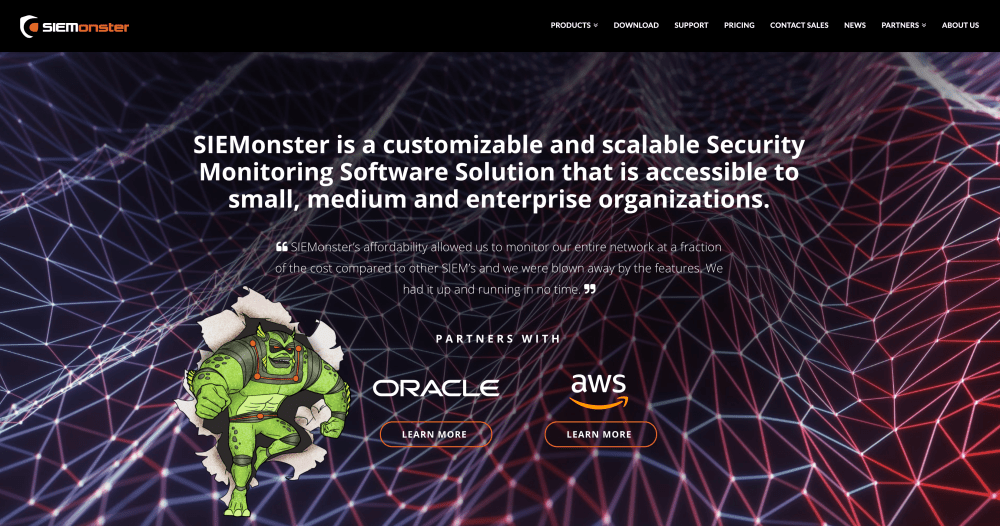 SIEM Monster is a favourite for many organizations because of the possibility to customize it according to organisational needs of any size whether it be a small, medium or large enterprise. It brings together several open source solutions into one centralized platform and provides threat intelligence in real-time, protecting its users against real-time attacks.
SIEM Monster is a favourite for many organizations because of the possibility to customize it according to organisational needs of any size whether it be a small, medium or large enterprise. It brings together several open source solutions into one centralized platform and provides threat intelligence in real-time, protecting its users against real-time attacks.
Some of SIEM Monster’s features include;
- Human-Based Behavior- It is equipped with correlation options ensuring that the threats recorded are true and that false positives are minimized.
- Threat Intelligence- Real-time threat intelligence with commercial or open-source feeds to stop real-time attacks.
- Deep Learning- Machine Learning is at the back of this feature and it teaches the program to automatically kill any attacks that might arise.
A key positive for this tool is that it can be run on-site or in the cloud.
3. Wazuh
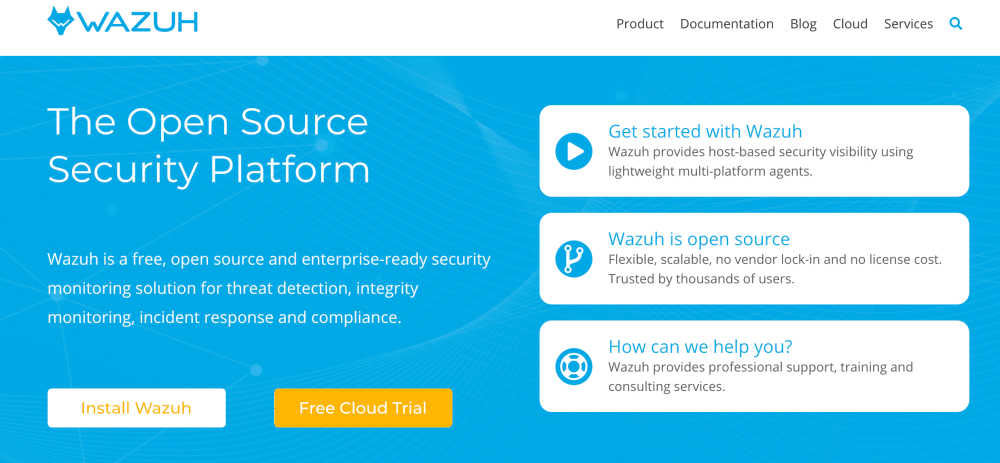 Wazuh is a common choice among enterprises because it is fully equipped with capabilities in threat detection, integrity monitoring, compliance and as an incident management tool. Wazuh collects, aggregates, indexes and analyzes security data making it possible for organizations to detect intrusions, identify threats and any behavioural anomalies that may arise. It boasts many features including;
Wazuh is a common choice among enterprises because it is fully equipped with capabilities in threat detection, integrity monitoring, compliance and as an incident management tool. Wazuh collects, aggregates, indexes and analyzes security data making it possible for organizations to detect intrusions, identify threats and any behavioural anomalies that may arise. It boasts many features including;
- Intrusion Detection
- Log Data Analysis
- File Integrity Monitoring
- Vulnerability Detection
- Configuration Assessment
- Incident Response
- Regulatory compliance
- Cloud security
- Containers security
Wazuh is a great enterprise choice because it’s flexible, scalable, free of vendor lock-in and has no licence costs. Its downside has been a limitation in its power to handle numerous alerts which sort of compromises its integrity.
4. Snort
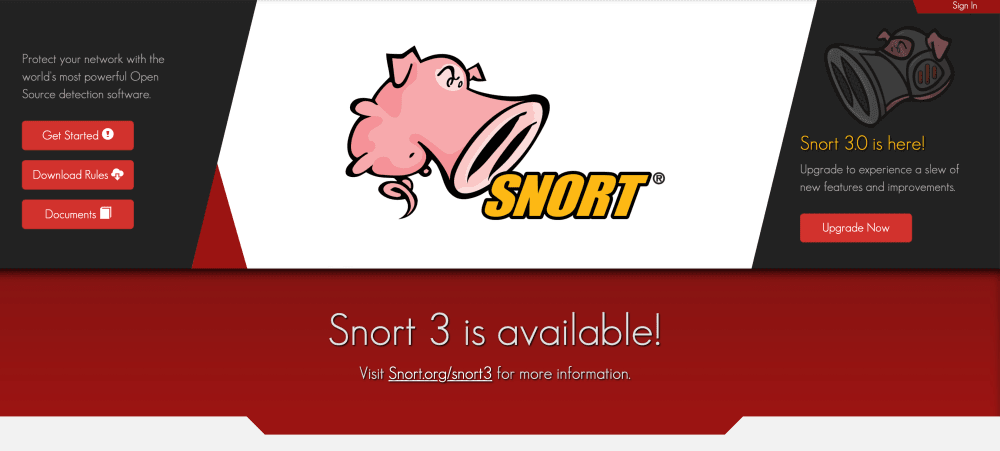 Snort is an open-source Intrusion Prevention System (IPS). It is a great tool for enterprises seeking a tool that can do network traffic analysis in real-time.
Snort is an open-source Intrusion Prevention System (IPS). It is a great tool for enterprises seeking a tool that can do network traffic analysis in real-time.
It is also equipped with log analysis capabilities and the ability to display traffic or dump streams of packets to log files. Users have access to a user manual, FAQ file and guides on how to locate and use Oinkcode. Snort has three great uses:
- As a packet sniffer like tcpdump
- As a packet logger which is most useful for network traffic debugging
- As a comprehensive network intrusion prevention system
- Snort is a bit technical in nature with a not very user-friendly interface.
5. OSSEC
 Is a scalable, multi-platform, open-source, host-based Intrusion Detection System. It is popular because it runs on most operating systems including Linux, OpenBSD, FreeBSD, MacOS, Solaris and Windows.
Is a scalable, multi-platform, open-source, host-based Intrusion Detection System. It is popular because it runs on most operating systems including Linux, OpenBSD, FreeBSD, MacOS, Solaris and Windows.
OSSEC brags a powerful correlation and analysis engine with features including;
- Log analysis
- File integrity monitoring
- Windows registry monitoring
- Centralized policy enforcement
- Rootkit detection
- Real-time alerting and active response.
- Compliance Auditing
- System Inventory
Security professionals working in big enterprises have a liking for this tool because it allows you to monitor many networks from a single station. You can also count on the inclusive community of OSSEC developers and users simplifying your time using this tool.
Among other pros, OSSEC can operate in both server-agent mode and serverless modes making it very flexible.
6. Sagan
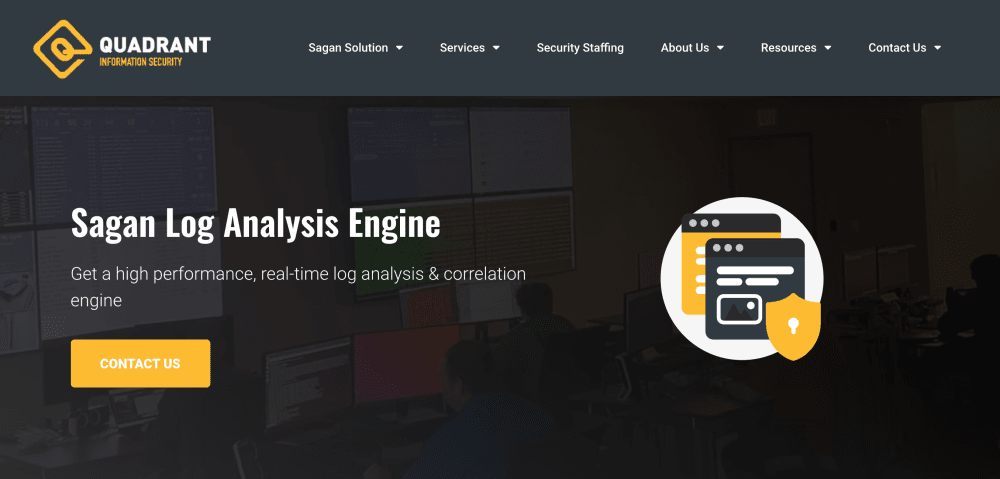 Sagan was developed by Quadrant Information Security as a high-performance open-source tool operating real-time analysis and correlation. It operates under Linux, FreeBSD and OpenBSD operating systems.
Sagan was developed by Quadrant Information Security as a high-performance open-source tool operating real-time analysis and correlation. It operates under Linux, FreeBSD and OpenBSD operating systems.
Sagan’s key features which also double as benefits include;
- Compatibility with popular graphical-base security consoles like Snorby, BASE, Squil and Evebox.
- Its CPU and memory resources are lightweight making it easy to set up and maintain.
- It allows data exportation from other SIEM tools using Syslog.
- It can track the geographic component of any events that happen so you can attack a location to every event.
- It can also monitor the time that events take place.
A user can set certain criteria on how the tool makes alerts which protect the user from being bombarded with alerts.
7. Logit.io
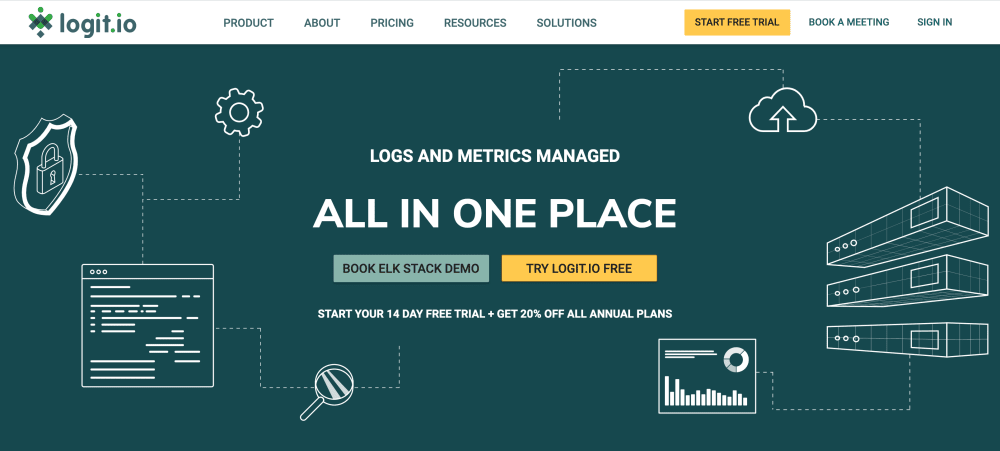 Logit.io provides a highly affordable SIEM tool that is built on hosted ELK. The ELK Stack is composed of several complimentary SIEM offerings including ElasticSearch, Logstash, Kibana and Beats. ELK also plays a key part of the architecture behind OSSEC, Apache Metron, SIEM Monster and Wazuh, which are all mentioned in this blog.
Logit.io provides a highly affordable SIEM tool that is built on hosted ELK. The ELK Stack is composed of several complimentary SIEM offerings including ElasticSearch, Logstash, Kibana and Beats. ELK also plays a key part of the architecture behind OSSEC, Apache Metron, SIEM Monster and Wazuh, which are all mentioned in this blog.
SIEM as a Service is Logit.io’s managed offering providing all of the key components required for organisations to secure their operations at one of the most affordable rates in the industry.
With high availability and SLAs up to 99.999%, you can be assured that Logit.io provides an ideal solution for scalable Security Information and Event Management.
Logit.io is also rated 5/5 stars on Capterra, Software Advice and Gartner.
Features include:
- Advanced role-based access controls
- Lightning-fast deployment
- Hundreds of integrations
- Compliance & auditing
- Affordable SIEM
- Event correlation
- Scheduled reports
- Alerting & notifications
8. Apache Metron
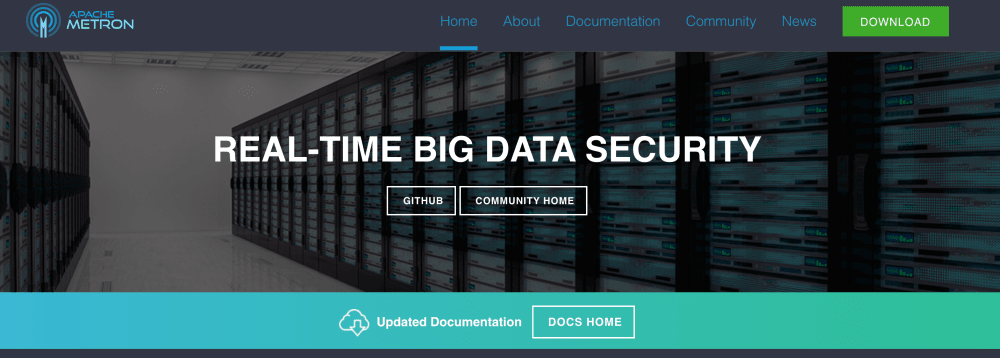 Apache Metron is the perfect tool for organizations looking for Big Data Security. It provides a scalable advanced security analytics framework providing organizations with the ability to detect cyber anomalies and equipping those organizations to be able to rapidly respond to the anomalies that arise.
Apache Metron is the perfect tool for organizations looking for Big Data Security. It provides a scalable advanced security analytics framework providing organizations with the ability to detect cyber anomalies and equipping those organizations to be able to rapidly respond to the anomalies that arise.
Apache Metron has many great features including;
- SOC Analyst identifying the alerts that come up
- SOC Investigator to identify and triage anomalies
- SOC Manager to automatically create cases with integrated workflow systems
- Forensic Investigator undertaking evidence collection response in real-time
- Security Platform Engineer- a single platform that manages and operates the integration and processing of cyber data.
- Security Data Scientist to perform data science lifecycle activities, train, evaluate and score analytical models.
9. Prelude
 Prelude is a universal SIEM system and it collects, normalizes, sorts, aggregates, correlates and reports all security-related events independent of the product brand or licence giving rise to such events. Third-party agents to this tool include Auditd, OSSEC, Suricata, Kismet and ClamAV.
Prelude is a universal SIEM system and it collects, normalizes, sorts, aggregates, correlates and reports all security-related events independent of the product brand or licence giving rise to such events. Third-party agents to this tool include Auditd, OSSEC, Suricata, Kismet and ClamAV.
The key features of Prelude include:
- Pilot- Prelude offers a central point of control for your information system’s security. It collects all the traces, correlates and aggregates them to provide an easily operated overall view.
- Detect- It detects any hacking attempt in the security system by combining various detection technologies.
- React- It handles any intrusion of the security of the system and provides support throughout the mediation phase of attacks by carrying out investigation and resolution of workflow functionalities.
10. Splunk Free
 Splunk Free as the name suggests is the free version of Splunk Enterprise, its paid version. Splunk Enterprise is a comprehensive SIEM tool and its free version shares a number of its features but may not handle all the security needs of your organization especially as it grows.
Splunk Free as the name suggests is the free version of Splunk Enterprise, its paid version. Splunk Enterprise is a comprehensive SIEM tool and its free version shares a number of its features but may not handle all the security needs of your organization especially as it grows.
Splunk Free allows you to index up to 500MB of data every day and you have lifetime access (no expiration date).
This means you can add 500 MB of fresh data daily and as your data size needs to expand, you can turn to the enterprise version. To say briefly, Splunk features Artificial Intelligence and Machine Learning which make it become more versatile and more intelligently addresses threats as the days go by.
Splunk Free has some features disabled including;
- Alerting/monitoring
- No user roles so no login capabilities
- Deployment management capabilities
- Index clustering
Therefore as you consider using this tool, you will be limited in the above ways. Nonetheless, it is one of the tools smaller enterprises have found value using.
11. Mozdef
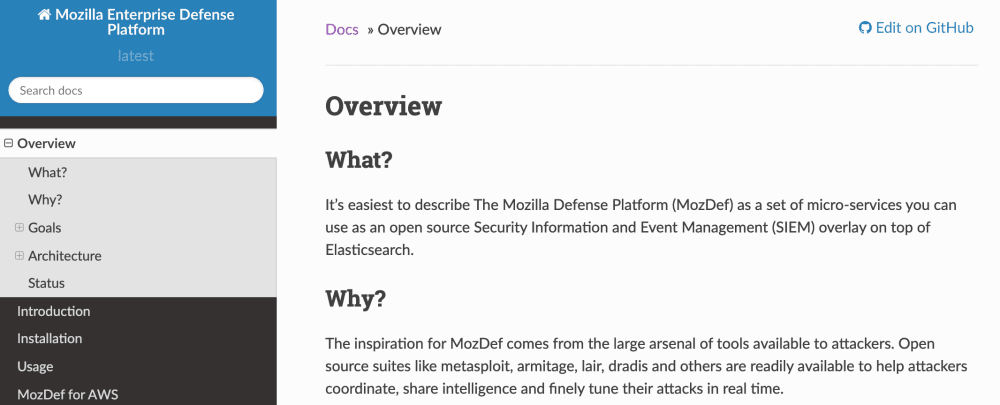 Mozdef was developed by Mozilla and is operated in an AWS account. It is one of the large arsenal of tools available for attackers helping them coordinate, share intelligence and fine-tune attacks in real-time.
Mozdef was developed by Mozilla and is operated in an AWS account. It is one of the large arsenal of tools available for attackers helping them coordinate, share intelligence and fine-tune attacks in real-time.
The goals behind the development of Mozdef include;
- Providing a platform for defenders to rapidly discover and respond to security incidents.
- Providing the necessary metrics for security events and incidents.
- Facilitating repeatable, predictable processes for incident handling.
- Driving collaboration in real-time amongst incident handling.
12. Security Onion
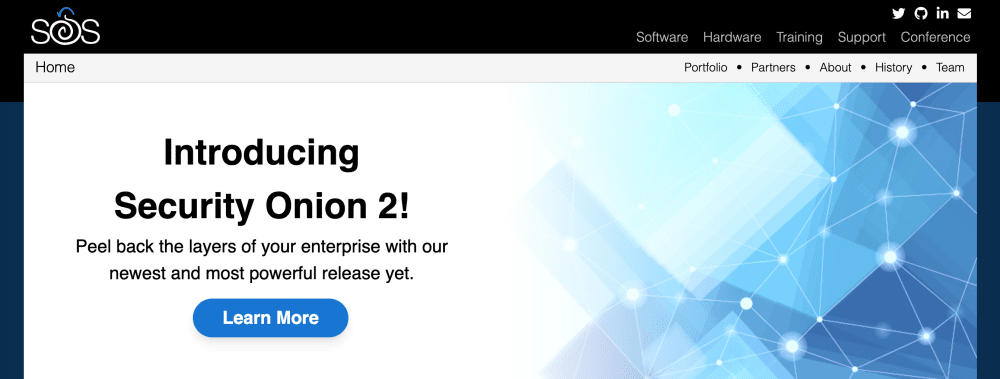 Security Onion is a Linux distribution designed for intrusion detection and Enterprise Security Monitoring (ESM). It was developed in 2008 by Doug Burks who later launched Security Onion Solutions in 2014.
Security Onion is a Linux distribution designed for intrusion detection and Enterprise Security Monitoring (ESM). It was developed in 2008 by Doug Burks who later launched Security Onion Solutions in 2014.
It is a flexible tool providing both host-based and network-based intrusion detection systems (IDS), as well as Full Packet Capture (FPC). If your organization is searching for a tool that will make threat hunting, enterprise security monitoring and also offers the features commonly associated with logging systems, then this one is a viable option.
Security Union is a collection of Elasticsearch, Logstash, Kibana, Suricata, Zeek (formerly known as Bro), Wazuh and many other security tools.
It can be used in several capacities including;
- NIDS- It collects network events from Zeek, Suricata and other tools to complete coverage of your organization network.
- HIDS- It supports host-based event collection agents including Wazuh, Beats and Osquery.
- Static Analysis (PCAP Import)- It can be used to import PCAP files for quick static analysis and case studies.
It mainly operates with the following data types; Agent, Alert, Asset, Extracted Content, Full Content, Session and Transaction.
13. Suricata
 Initially built as an Intrusion Detection and Prevention tool (IDS/IPS) and has now grown, adding important protocol detection and Network Security Monitoring (NSM) capabilities.
Initially built as an Intrusion Detection and Prevention tool (IDS/IPS) and has now grown, adding important protocol detection and Network Security Monitoring (NSM) capabilities.
Some of its great features include;
- NSM: Suricata can log HTTP request logs and store TLS certificates, extract files from flows and store them on a disk.
- IDS/IPS
- Automatic Protocol Detection for protocols such as HTTP on any port and applying the proper detection.
A great pro of this tool is its high-performance capabilities whereby a single Suricata instance is capable of inspecting multi-gigabit traffic.
14. Graylog
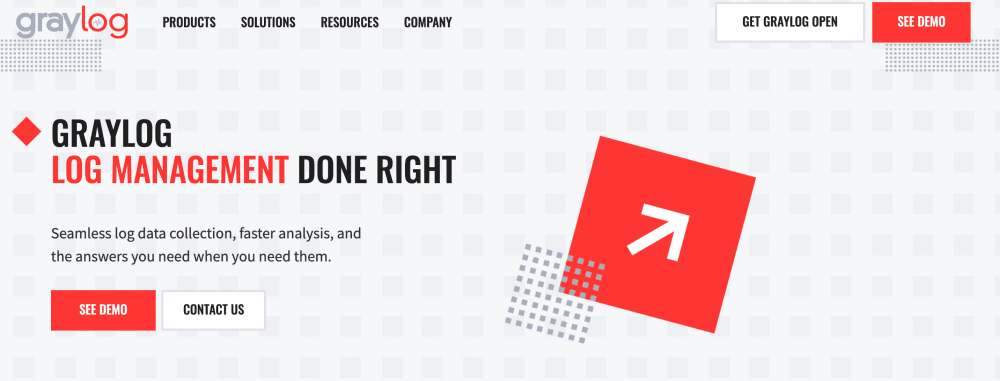 Our last tool but by no means the least is Graylog. It is a log management platform that gathers data from different locations across your network infrastructure.
Our last tool but by no means the least is Graylog. It is a log management platform that gathers data from different locations across your network infrastructure.
It is worth a look considering its great scalability, user-friendly interface and great functionality.
Graylog’s great features include;
- Customizable dashboards allowing you to choose what metrics or data sources you will monitor and analyze.
- Built-in fault tolerance that can run multi-threaded searches to analyze several potential threads together.
15. Panther
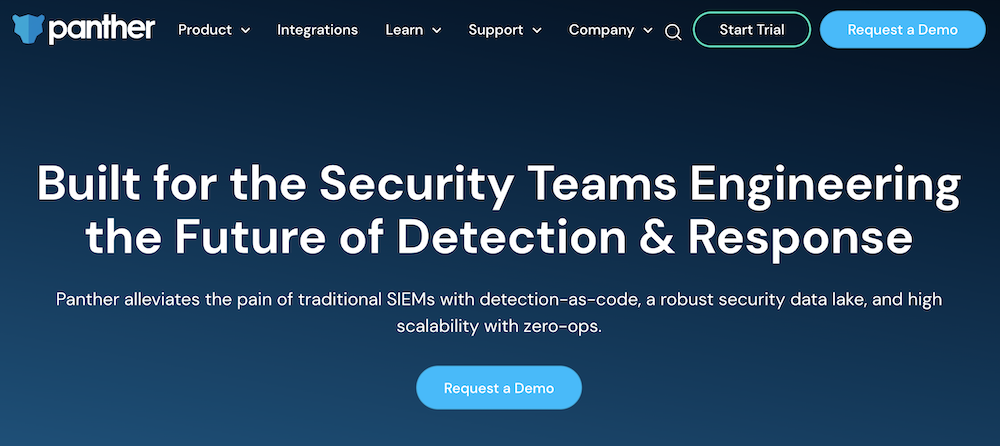
Panther simplifies the consolidation of security data by integrating with the organization's cloud data platform, making the process easier. It enhances efficiency by providing pre-built log parsing and detection rules, simplifying the setup process for the users. Moreover, Panther offers flexibility by allowing the creation of personalized real-time alerts using Python, ensuring prompt notifications on preferred platforms. The platform also supports out-of-the-box support for popular destinations such as Slack, Jira, PagerDuty, and more.
Features include;
- Alert triage
- Searching IOCs
- Securing cloud resources
16. Blumira
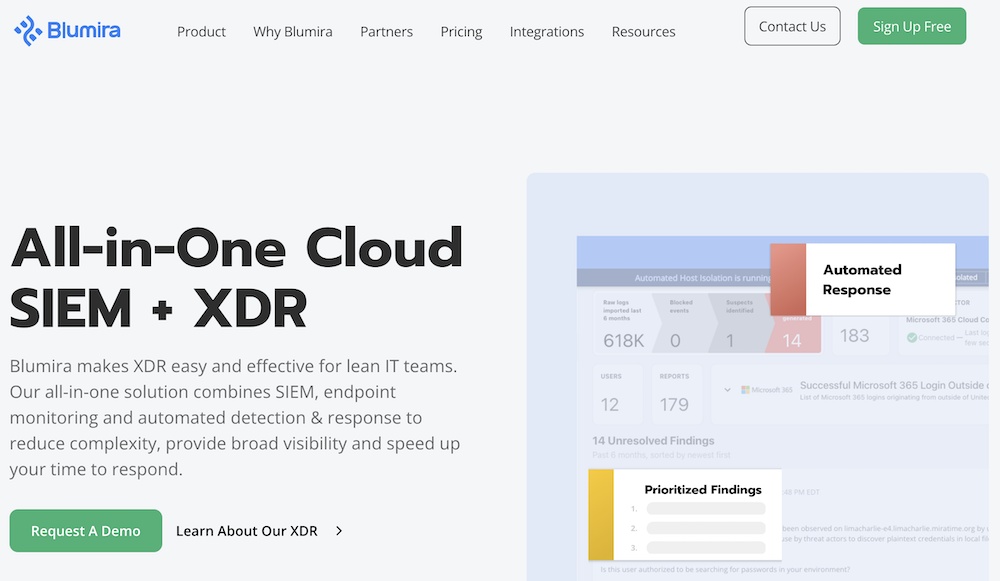
Blumira simplifies the XDR experience for IT teams, offering a comprehensive solution that combines SIEM, endpoint monitoring, and automated detection & response. By leveraging threat detection capabilities, Blumira enables the identification of potential risks. Real-time alerts are dispatched within a minute of initial detection, empowering teams to respond to threats. Their platform presents prioritized findings, thoughtfully curated by their security engineers, relieving much of the burden of manual alert analysis.
Features include;
- Automated host isolation
- Manual dynamic blocklists
- Managed detections & rule insight
17. QRadar
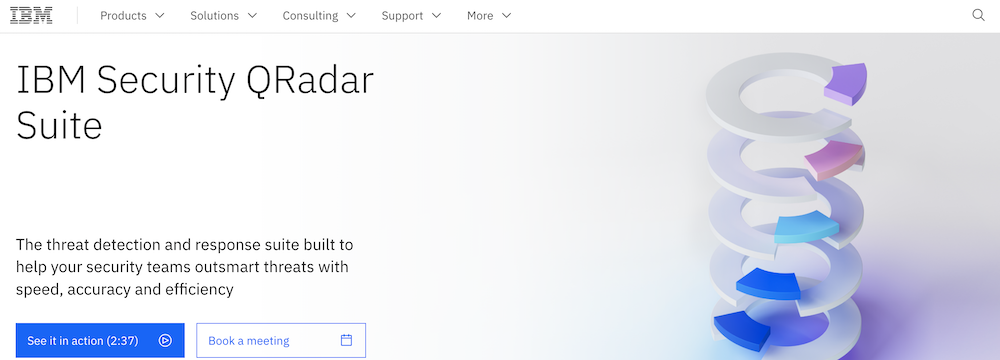
The IBM Security® QRadar® Suite provides a solution for threat detection and response. Its primary goal is to enhance the overall experience and efficiency of security analysts throughout the entire incident lifecycle. It is particularly valuable for security teams facing resource limitations, as it enables them to work more effectively across various core technologies. The suite integrates a comprehensive range of products, including EDR, XDR, and MDR for endpoint security, as well as log management, SIEM, and SOAR functionalities.
Features include;
- Unified analyst experience
- Pre-built integrations
- Cloud delivery
18. Exabeam
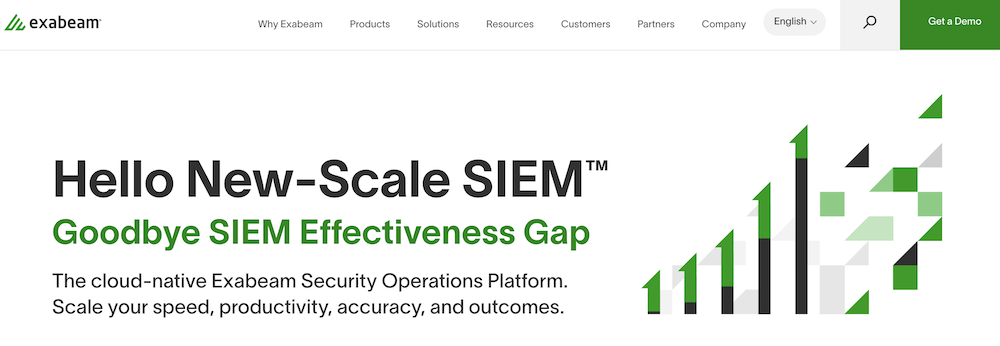
Exabeam provides a third-generation SIEM platform that offers users ease of implementation. Their SIEM service is a cutting-edge solution that enhances security operations. Their services assist organizations in identifying threats, safeguarding against cyberattacks, and overcoming adversaries. By leveraging Exabeam's cloud-scale security log management, behavioral analytics, and automated investigation expertise, users gain an advantage in combating insider threats and other cyber criminals.
Features include;
- Powerful behavioral analytics
- Automated investigation experience
- Cloud-scale security log management
19. ArcSight ESM
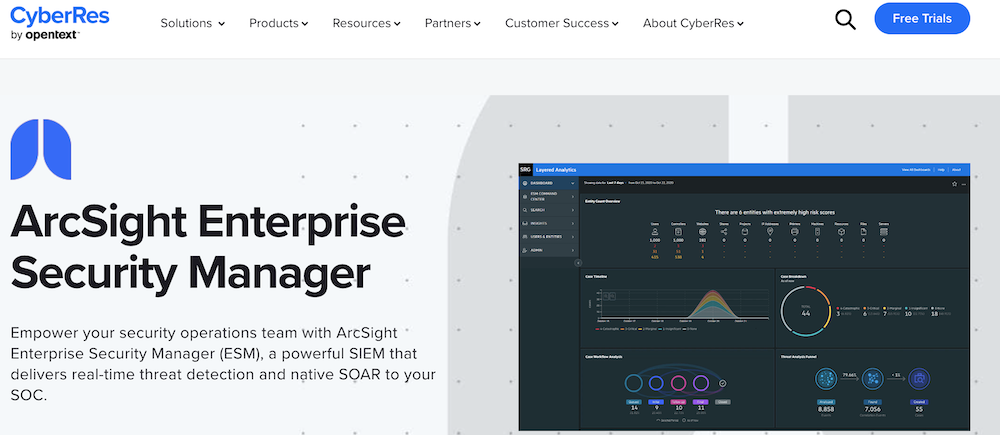
The ArcSight Enterprise Security Manager (ESM) is known for its ability to reduce the time required to detect, respond to, and address cyber-security threats in real-time. This robust SIEM solution employs advanced event correlation analytics to empower security teams in the identification and mitigation of both internal and external threats. As a result, Security Operation Centers (SOCs) can effectively handle a higher volume of threats without the need for additional staff, thanks to simplified SOC workflows.
Features include;
- Detect threats in real-time
- Native threat intelligence
- Content and reporting
20. FortiSIEM
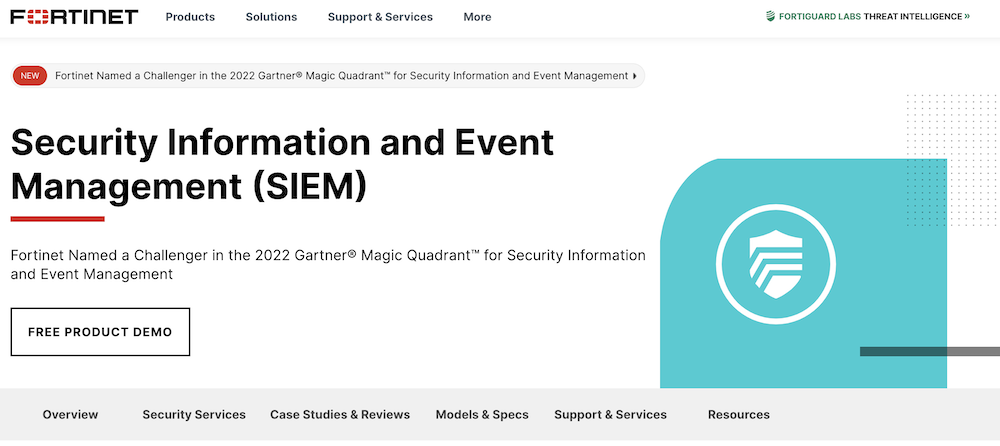
FortiSIEM is a solution for security operations teams, providing users with a wide range of capabilities. This platform automates tasks such as asset inventory building and employs cutting-edge behavioral analytics to swiftly detect and respond to threats. FortiSIEM also boasts a fully integrated configuration management database (CMDB). By bringing together visibility, correlation, automated response, and remediation, FortiSIEM offers a scalable and comprehensive solution.
Features include;
- Self-learning asset inventory
- Real-time security analytics
- Industry-leading threat intelligence
SIEMBol
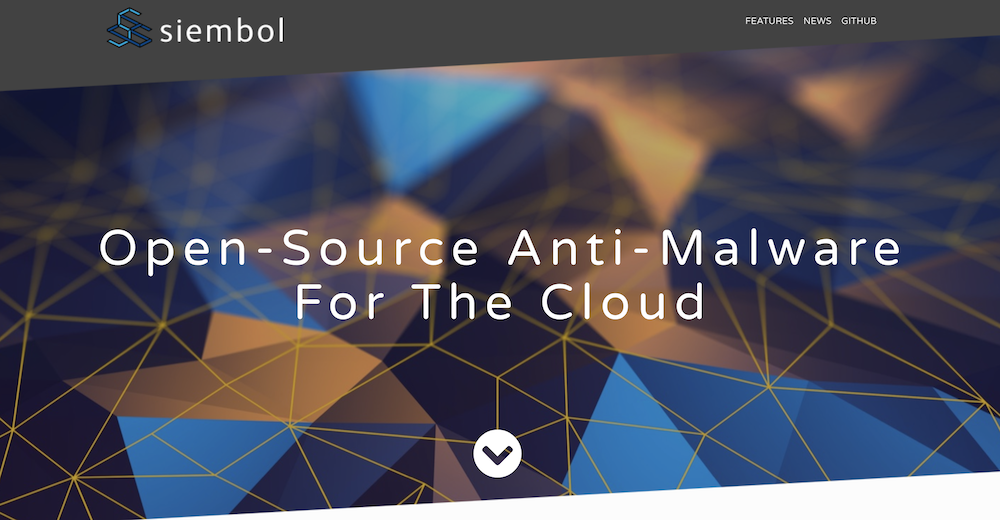 Siembol is an open-source SIEM tool that supplies a scalable, advanced security analytics framework based on open-source big data technologies. Siembol allows users to standardize, enhance, and issue alerts dependent on data sourced from a variety of channels. This capability enables security teams to proactively address potential threats, stopping them from escalating into full-blown incidents.
Siembol is an open-source SIEM tool that supplies a scalable, advanced security analytics framework based on open-source big data technologies. Siembol allows users to standardize, enhance, and issue alerts dependent on data sourced from a variety of channels. This capability enables security teams to proactively address potential threats, stopping them from escalating into full-blown incidents.
Features include;
- Detect attacks or leaks
- Monitor logs from different sources
- Centralize security data collecting
Matano
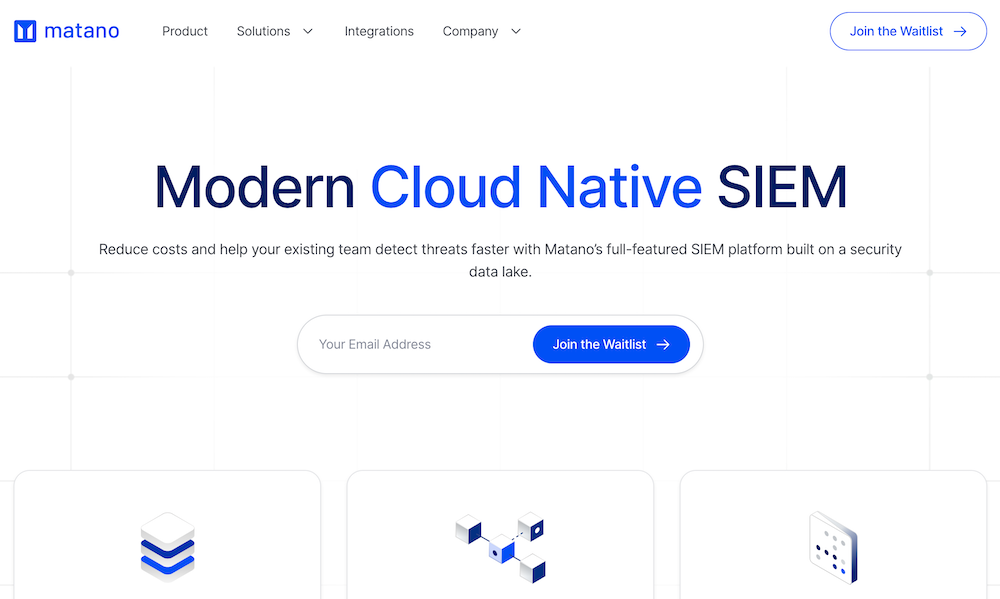 Matano is a full-featured SIEM platform built on a security data lake. With this SIEM tool, you can ingest and store your entire security data into a scalable data lake. Enabling you to analyze this data to detect and respond faster to threats in real time. As well as this, with Matano you can easily search your data and create detection rules across your data lake using an intuitive search language.
Matano is a full-featured SIEM platform built on a security data lake. With this SIEM tool, you can ingest and store your entire security data into a scalable data lake. Enabling you to analyze this data to detect and respond faster to threats in real time. As well as this, with Matano you can easily search your data and create detection rules across your data lake using an intuitive search language.
Features include;
- Unified security data lake
- Search and detect with SPL compatible query language
- Contextualize alerts in real-time
DSIEM
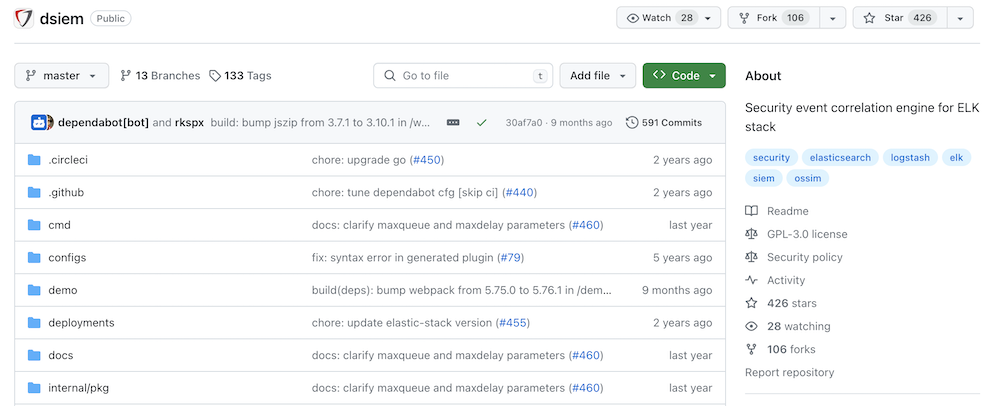 Dsiem is a security event correlation engine for the ELK stack, enabling the platform to be utilized as a dedicated and full-featured SIEM system. The tool supplies OSSIM-style correlation and directive rules, bridging the easier transition from OSSIM. Built-in support for Arkime, Wise, and Nessus CSV exports. Support for a range of other sources as well, implemented as plugins.
Dsiem is a security event correlation engine for the ELK stack, enabling the platform to be utilized as a dedicated and full-featured SIEM system. The tool supplies OSSIM-style correlation and directive rules, bridging the easier transition from OSSIM. Built-in support for Arkime, Wise, and Nessus CSV exports. Support for a range of other sources as well, implemented as plugins.
Features include;
- OSSIM-style correlation and directive rules
- Loosely coupled, designed to be composable with other infrastructure platforms
- Instrumentation support through Metricbeat and/or Elastic APM server
SIEM GDPR
The SIEM GDPR tool aims to execute the open-source SIEM prototype and produce a tool for examining and finding threats in real time. As well as, guarantee performance following GDPR guidelines. The tool aims to provide a solution where it is possible to pseudonymize the logs without losing the ability to identify threats and attacks.
Features include;
- Pseudonymize logs and still identify threats and attacks
- Maintaining GDPR compliance
- Examine threats in real-time
Comparison Table
| Tool | Key Features | Strengths | Limitations |
|---|---|---|---|
| AlienVault OSSIM | Asset discovery, IDS, SIEM correlation, vulnerability assessment | Comprehensive threat detection, automated responses | Limited flexibility, labor-intensive setup |
| SIEM Monster | Human-based behavior, threat intelligence, deep learning | Customizable, real-time threat intelligence | Requires setup for customization |
| Wazuh | Intrusion detection, log analysis, file integrity monitoring | Flexible, scalable, no license costs | Limited handling of numerous alerts |
| Snort | Packet sniffer, packet logger, IPS | Real-time network traffic analysis | Technical interface |
| OSSEC | Log analysis, file integrity monitoring, rootkit detection | Multi-platform, centralized policy enforcement | Complex configuration |
| Sagan | Real-time analysis, correlation, geo-tracking | Lightweight, easy to set up | Requires configuration for alerts |
| Logit.io | Role-based access, fast deployment, compliance, auditing | Affordable, high availability | Subscription-based |
| Apache Metron | SOC analytics, anomaly detection, forensic investigator | Scalable, advanced security analytics | Complex setup |
| Prelude | Central control, detection, reaction | Universal SIEM, multi-brand compatibility | High learning curve |
| Splunk Free | AI, ML, 500MB/day indexing | Lifetime access, versatile | Limited features compared to enterprise |
| Mozdef | Rapid incident response, real-time collaboration | Developed by Mozilla, AWS operated | Limited to AWS |
| Security Onion | NIDS, HIDS, static analysis | Comprehensive ESM, flexible | Requires Linux |
| Suricata | IDS, IPS, NSM, protocol detection | High-performance, multi-gigabit traffic | Technical setup |
| Graylog | Log management, customizable dashboards, fault tolerance | Scalable, user-friendly | Requires setup for advanced use |
| Panther | Alert triage, cloud resource security | Pre-built parsing, real-time alerts | Requires cloud integration |
| Blumira | Automated host isolation, manual blocklists | SIEM, endpoint monitoring, real-time alerts | Subscription-based |
| QRadar | Unified analyst experience, cloud delivery | Comprehensive threat detection | Expensive |
| Exabeam | Behavioral analytics, automated investigation | Cloud-scale log management | High cost |
| ArcSight ESM | Real-time threat detection, native threat intelligence | Advanced event correlation | Complex setup |
| FortiSIEM | Asset inventory, security analytics, threat intelligence | Automated tasks, integrated CMDB | High cost |
| Siembol | Attack detection, log monitoring, security data collection | Scalable, advanced analytics | Technical setup |
| Matano | Unified data lake, real-time alert contextualization | Scalable, SPL compatible | Requires data lake setup |
| DSIEM | ELK stack correlation, directive rules | OSSIM-style, supports multiple sources | Technical setup |
| SIEM GDPR | Log pseudonymization, GDPR compliance | Real-time threat examination | Requires GDPR focus |
If you enjoyed this article on the best SIEM tools but want to find out more on SIEM? Then look no further than our dedicated guide on what exactly is SIEM?
